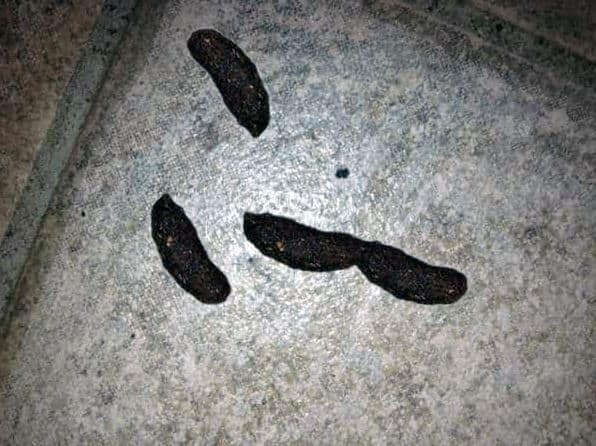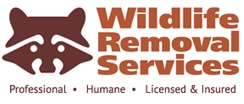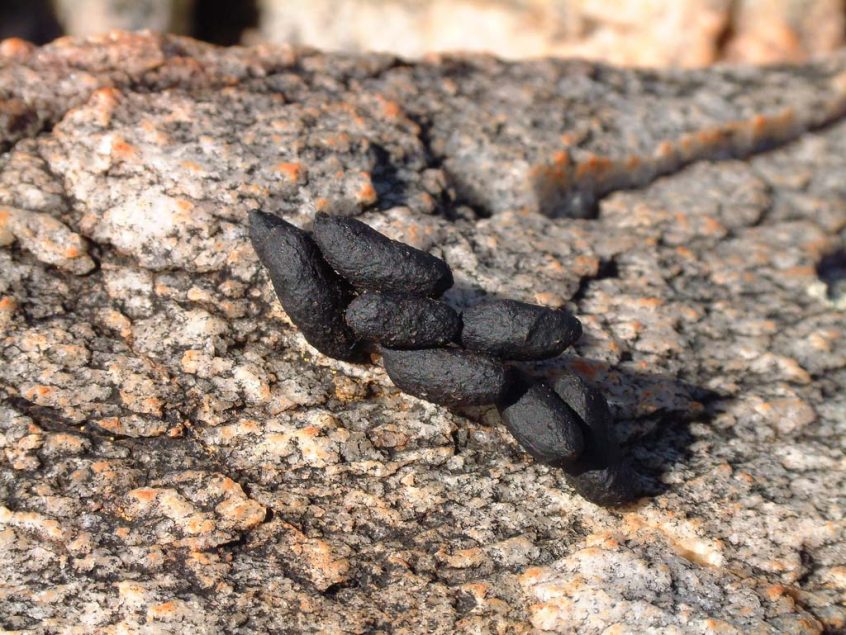Where Are Possums Found?
Before we learn what possum poop looks like, let us learn a little bit about the (o)possum The small marsupial known as the possum can be located in many regions across America, including South, North, and Central America. There are over 100 different varieties of possums and they all poop, but the Virginia opossum is the most common in North America. The Virginia opossum makes its home anywhere east of the Rocky Mountains.
Related article: How To Get Rid Of Possums
Within those regions, the Virginia opossum (also known as the common possum) can be found in a range of habitats, including farmland, deciduous forests, and woods, as well as the wetlands near swamps or marshes. They don’t just stick to the wild either. Possums can often be spotted in small towns and suburbs, unusually late at night near garbage cans.
How Do You Identify Possum Poop?
We might first ask ourselves, what do possums eat? It can be a little difficult to positively identify possum feces because it is often confused with dog droppings. Possum poop can be as large as two inches long with a diameter of around three-fourths of an inch. The droppings are thicker in the center and thinner near the ends, sometimes even curling slightly. They’re usually brown, but they can have yellow or white mold growth as well.
Related article: What You Need To Know About Possum Poop

multiple possum droppings on the floor
Possums like to stick to one area for waste, so it’s not uncommon to find a mix of possum urine and lots of droppings in the same spot. Preferred toilet areas include near possum feeding zones. If you’re noticing droppings around a garbage can or a tree, it could be from a possum using that as a feeding spot.
What Should You Do If You Find Possum Poop?
If you locate possum poop inside your home rather than outside it, you should take immediate action, as the possum has likely taken up residence in your house. If you have pets such as a dog or a cat, or if you think the possum could come from another wild animal, first take the time to ascertain that the droppings come from a possum. If you know a possum is in your home, there are several steps you should take, beginning with getting rid of the possum infestation. Then you should take steps to prevent more possums from getting in the future and be sure to clean any areas thoroughly the possum may have touched. In addition to the potential to carry diseases, possum droppings generally smell quite strongly, so you’ll want to take care of the problem and clean it up as quickly as you can.
If droppings are located outside the house, try to find areas where the possum could be nesting, such as in a shed or garage, or under a deck or the house. If a possum has wandered into a town, it’s likely seeking shelter, so look for places that would keep it safe from the elements.
Related article: Identifying Squirrel Poop
Possum Poop is Dangerous
Exposure to possum droppings comes with many health risks, so you’ll want to dispose of waste as soon as you possibly can carefully. Follow these tips to quickly and effectively clean up after a possum infestation:
- Purchase and wear a HEPA (High-Efficiency Particulate Air) mask and gloves at a minimum; consider a full-body protective suit.
- Pick up droppings and dispose of them in plastic bags.
- Scrub down and strongly disinfect any area exposed to the possum droppings. If you have carpet, insulation, furniture, or anything else that cannot be cleaned appropriately, you’ll want to replace it entirely.
- After all droppings have been removed, use a powerful disinfectant or an enzyme-based cleaning agent to wash down the area.
- If possible, use a fogger in the affected area, as it will be able to reach and disinfect every corner and the hidden surface of the space, even if you cannot achieve it on your own.
Possum droppings can contain hazardous bacteria, such as Leptospirosis or Salmonella. They commonly carry a very infectious disease known as EPM (Equine Protozoal Myeloencephalitis), which can quickly kill horses by attacking their nervous systems.
Related article: How The Possum Diet Affects You
When Should You Contact a Professional to Help With Your Possum Infestation?
As previously mentioned, possum waste can be hazardous to handle or live around, which makes exhaustive clean-up extremely important (as well as extremely time-consuming). This clean-up process can be done on your own, but only if you make sure to do so safely and have the time to dedicate toward it.
Even if you have the energy and time to handle clean-up on your own, though, there are some scenarios in which you really should turn to a professional for opossum removal. These include the following:
- If the possum has nested in an area that is not easily physically accessible, such as inside of a wall or in a tiny crawl space.
- If you are unable to obtain the appropriate tools, including a powerful mask, a fogger, and powerful cleaning agents.
- If you’re uncertain how big the infestation is and would like the professional to investigate and determine the overall damage.
- If you perform removal and clean-up but locate more droppings after doing so and need help pinpointing measures to more permanently stop the infestation.

